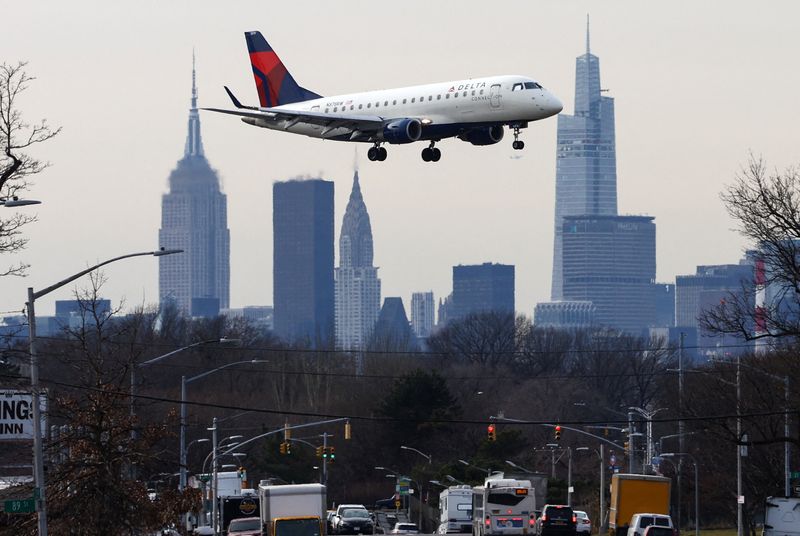By Rajesh Kumar Singh
CHICAGO (Reuters) -Pilots at Delta Air Lines (NYSE:DAL) have ratified a new contract that includes over $7 billion in cumulative increases in pay and benefits over four years and is widely expected to be a benchmark for contract negotiations at rival carriers.
The Air Line Pilots Association (ALPA), which represents Delta's pilots, said on Wednesday that 78% of the carrier's pilots voted in favor of the contract.
Both American Airlines (NASDAQ:AAL) and United Airlines have promised an "industry-leading" contract to their pilots. As a result, their pilots say that any proposal seen as inferior to Delta's will likely have no takers.
"Delta has raised the bar," said Dennis Tajer, a spokesman for American's pilots union. "Repairing a pilot's work life balance and the scheduling practices under which they are flying are the core issues along with the compensation."
Delta's new contract provides a 34% cumulative pay increase, a lump-sum one-time payment, reduced health insurance premiums and improvements in holiday pay, vacation, company contributions to 401(k) and work rules.
It will cover 15,000 Delta pilots and come into effect on Thursday, ALPA said.
United's pilots have been conducting informational pickets to express frustration over delays in contract negotiations. American pilots, who received their last pay increase in 2019, have also been protesting for a new contract.
The ratification of Delta's deal is expected to put greater pressure on the two carriers to conclude their contract negotiations.
American called the deal a "great" news for its pilots, adding it looked forward to reaching an agreement on new contract "quickly." But it also said Delta's contract has "profoundly" changed the economics for the entire airline industry.
United declined to comment.
Some airline executives are concerned that hefty pay raises for pilots will inflate fixed costs and make it tougher to repair debt-laden balance sheets.
Delta has forecast a hit on its earnings in the first quarter as the pilot deal is estimated to drive up its operating costs.
'WAR FOR TALENT'
The new contract showcases the bargaining power pilots are enjoying as carriers rush to staff up to keep up with travel demand.
Delta, United, American and Southwest Airlines (NYSE:LUV) are estimated to hire about 8,000 pilots this year.

Analysts at Jefferies estimate the United States is short of 10,000 pilots. This supply-demand gap is projected to last until 2027.
Airlines are "in the war for talent," said Ben Friedrich, a professor at Northwestern (NASDAQ:NWE) University Kellogg (NYSE:K) School of Management. "It's hard for other airlines to retain their pilots unless they follow suit and raise pay to a similar extent."